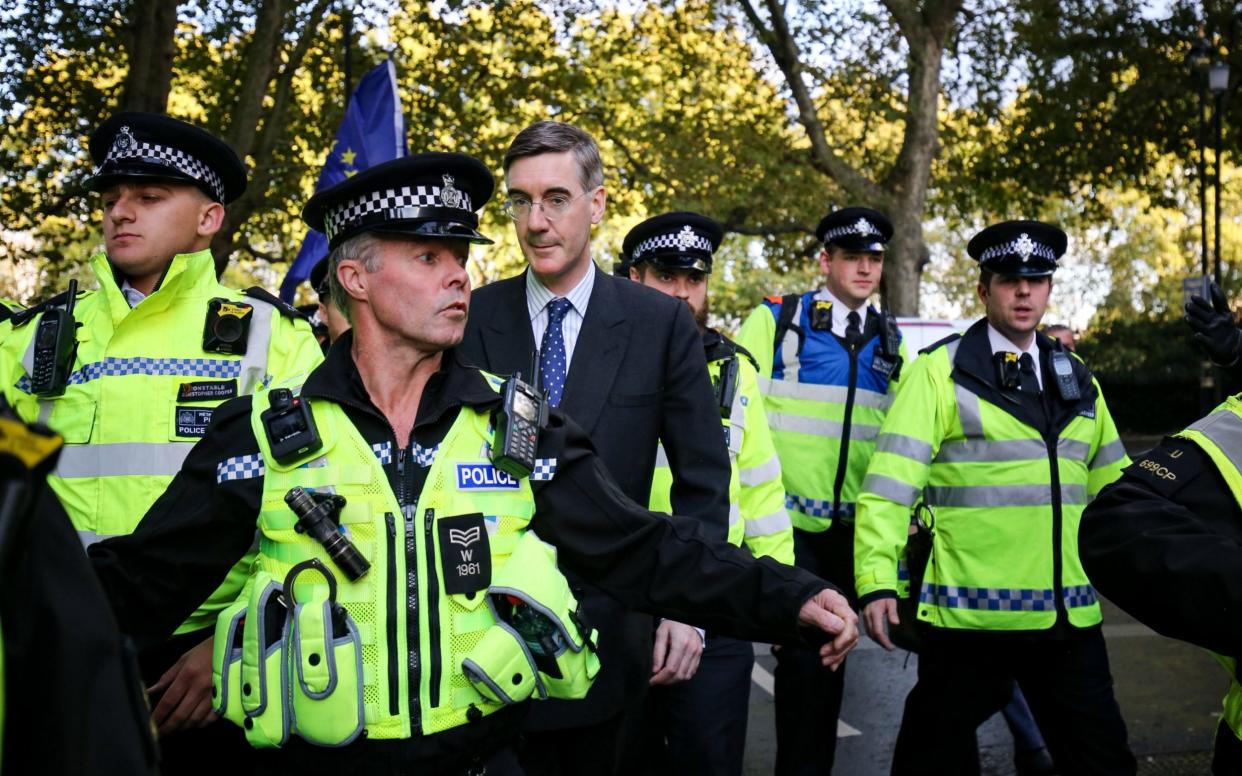Election candidates told not to go canvassing alone and 'think very carefully about language' in new police guidance

Election candidates have been told not to go out canvassing alone and to "think very carefully about language" in new police guidance amid rising hostility against politicians.
Tory leader Boris Johnson was forced to cancel a visit to a bakery on Thursday due to protesters, his opposite number Jeremy Corbyn has been routinely heckled during visits and police are investigating an alleged assault on the Hong Kong Justice Secretary overnight.
Against the backdrop of the murder of Jo Cox during the Brexit vote campaign, National Police Chiefs’ Council (NPCC) chairman Martin Hewitt said the current political landscape has been "highly charged for a long period of time".
And as a result of calling another election, police have seen an increased level of intimidation and harassment aimed at MPs, Mr Hewitt said.
The NPCC has therefore told candidates on the campaign trail ahead of the Dec 12 vote not to canvass alone, to think "very carefully" about the language they use and have appointed a Detective Superintendent to each candidate as a direct point of contact.
The full guidance to candidates reads:
Engage with their single point of contact within their local force for candidate security
Take active steps around personal safety to keep themselves and their campaign staff safe
Not to canvass alone and make sure someone knows where they are canvassing
Keep records of any intimidating behaviour or abuse
Conduct an online health check to ensure sensitive personal information is not widely available
Report intimidation or abuse to internet service providers and social media platforms
Make sure they go out with a fully-charged mobile phone
Think very carefully about the language they are using so that they are not inflaming the already highly-charged environment
Mr Hewitt said: "As with every election, police will work to prevent and detect crime, and enable the democratic process to proceed unhindered. We take this role extremely seriously.
"Abuse or intimidation of candidates in elections has serious implications for individuals and for our democracy. Practical guidance issued today will help candidates stay safe on the campaign trail. All police forces will offer security briefings for candidates and have a senior officer responsible for this.
"Strong and varied views are the mark of a healthy democracy, but these should not cross the line into criminal abuse, harassment or disorder. There are serious penalties for those who are found guilty of criminal offences.
"We’re not going to tell anyone to limit their campaigning or enthusiasm in any way – but we are taking precautionary steps ourselves and providing sensible advice to candidates."
The guidance gives candidates information about potential offences such as criminal damage, abusive or threatening behaviour, harassment, stalking, hate crimes and election related crimes such as false statements against a candidate’s character.
Candidates have also been warned of potential signals that behaviour could be escalating – threats of imminent violence, fixated ideas or release of personal information not already in the public domain – and to immediately call 999 in an emergency.
Electoral Commission Chief Executive, Bob Posner said: "It is vital that all parties and campaigners comply with election rules and campaign responsibly. Robust political debate is part of a healthy democracy, but sometimes things can go too far. Intimidating and abusive behaviour have no place in our political system.
"We will work closely with the National Police Chiefs’ Council, Crown Prosecution Service and College of Policing to provide all candidates with the support and guidance they need to stay safe during this election campaign."
Johnson cancels bakery visit because of 'crusty' protesters
Boris Johnson labelled climate change protesters "crusties" after security concerns forced him to change his election campaign visit to a bakery.
Extinction Rebellion activists were positioned outside Burns The Bread in Glastonbury, Somerset, prompting a decision to divert the Prime Minister to one of the company's shops in Wells.
Signs held by the protesters included one reading "Greedy fat Tory clown" and another which had Mr Johnson's face with expletives written on it.
The PM's team opted to switch location and he did not arrive at the Adlam Central Park venue.
Instead, Mr Johnson received a warm welcome in Wells and he served sausage rolls and pasties to customers.
Reflecting on the change of plan, he said: "There were lots of crusties there - more crusty than your loaves."
The Prime Minister then went on a short walkabout in Wells High Street, where he was cheered and welcomed by several people although there was some heckling from a handful of others.
He also visited a card shop, where he was presented with a card featuring a bulldog with a mop of blond hair located in Downing Street.
But Lynnsey Kelly, who runs a flower shop in the city, said of the Mr Johnson's visit: "Right at this very moment in time are there not more important things to be done in this country than the Prime Minister coming to somewhere like Wells and serving pasties to people and having a photo opportunity?
"It is absolutely disgusting."

 Yahoo News
Yahoo News 
